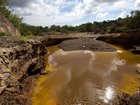A sprawling market floor in Guangzhou was once a prime location for shark fin, one of China's most expensive delicacies. But now it lies deserted, thanks to a ban from official banquet tables and a celebrity-driven ad campaign.
One shopkeeper at the Shanhaicheng center quietly ate his lunch at a desk, flanked by four glum-looking colleagues and giant white sacks overflowing with thousands of dollars' worth of unsold grey stock.
 Full Story
Full Story
Authorities in Mexico said Monday they have closed about 80 schools after sulfuric acid leaked from a copper mine in the country's northwest and contaminated the Sonora River.
"About 5,000 students from around 80 schools will not have classes this week because of a lack of water and in some locations their proximity to the river," said the director of the Sonora state civil protection agency, Jesus Arias.
 Full Story
Full Story
Man-made earthquakes, a side effect of some high-tech energy drilling, cause less shaking and in general are about 16 times weaker than natural earthquakes with the same magnitude, a new federal study found.
People feeling the ground move from induced quakes — those that are not natural, but triggered by injections of wastewater deep underground— report significantly less shaking than those who experience more normal earthquakes of the same magnitude, according to a study by U.S. Geological Survey geophysicist Susan Hough.
 Full Story
Full Story
One hand clinging to his boat's gunwale, Harun Muhammad submerges himself, eyes and ears wide open underwater as he "listens" for fish sounds emanating from the blue depths.
Harun is one of Malaysia's last "fish listeners," and he and his apprentice son Zuraini are believed to be the only active practitioners of this mysterious and dying local art.
 Full Story
Full Story
More elephants in Africa are being killed by poachers than are born each year, and the problem may be worse than previously understood, according to the most detailed assessment yet.
Using a newly refined approach to estimate elephant deaths, developed at Kenya's Samburu National Reserve, researchers said Africa's elephant population is declining at a rate of about two percent annually.
 Full Story
Full Story
Orbital Sciences Corporation's unmanned Cygnus cargo ship disintegrated as planned Sunday as it re-entered Earth's atmosphere after a month-long resupply mission to the International Space Station.
The spacecraft had been released from the orbiting lab on Friday at 6:40 am (1040 GMT), and then stayed in independent orbit for two days, before firing its engines and pushing into Earth's atmosphere.
 Full Story
Full Story
An archaeological dig at a Colonial military site in the southern Adirondacks of New York has turned up thousands of artifacts, from butchered animal bones to uniform buttons, along with a lime kiln used to make mortar for a British fort that was never completed.
The six-week project that ended Friday at the Lake George Battlefield Park also uncovered a section of a stone foundation and brick floor of a small building likely constructed alongside a barracks in 1759, during the French and Indian War.
 Full Story
Full Story
Orbital Sciences Corporation's unmanned Cygnus cargo ship left the International Space Station Friday on its way to a fiery re-entry into Earth's atmosphere.
The spacecraft was released from the orbiting lab at 6:40 am (1040 GMT), NASA said in a live broadcast of the event.
 Full Story
Full Story
Ramona Yesenia stood in her town square with two empty jugs, waiting for water to replace the municipal supply contaminated by a chemical spill that turned Mexico's Sonora river orange.
Yesenia is one of 20,000 people left without water since a massive sulfuric acid leak last week at the Buenavista copper mine in northwestern Mexico, one of the largest in the world.
 Full Story
Full Story
After more than a year of public criticism of its treatment of killer whales, SeaWorld said Friday that it will build new, larger environments at its theme parks and will fund additional research on the animals along with programs to protect ocean health and whales in the wild.
The Orlando, Florida, company said the renovations have been in the works for some time and that they are not a response to the documentary "Blackfish" or the criticism of the company that followed the release of the film.
 Full Story
Full Story



